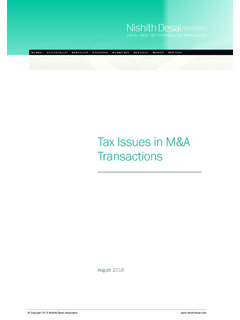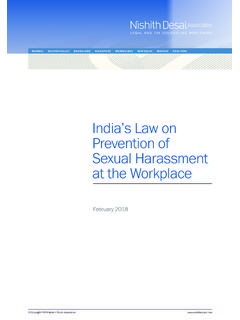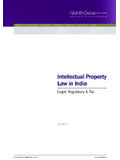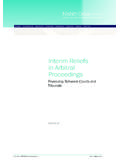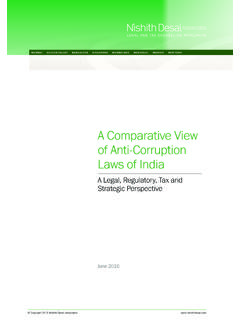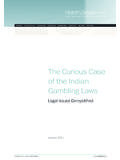Transcription of Employment Contracts in India - Nishith Desai
1 Copyright 2018 Nishith Desai Associates Employment Contracts in IndiaEnforceability of Restrictive CovenantsFebruary 2018 MUMBAI SILICON VALLEY BANGALORE SINGAPORE MUMBAI BKC NEW DELHI MUNICH NEW YORKF ebruary Contracts in IndiaEnforceability of Restrictive Covenants Nishith Desai Associates 2018 Nishith Desai Associates 2018 Provided upon request only Nishith Desai Associates 2018 Enforceability of Restrictive CovenantsEmployment Contracts in IndiaContents1. INTRODUCTION 012. RISE OF A NEW BREED OF Employment RELATED DISPUTES IN India 03I.
2 Pre-Hire 03II. During Employment 04 III. Termination 04IV. Post- Termination 053. THE STATUS OF RESTRICTIVE COVENANTS IN India 06I. Non-Competition Restriction 06II. Non-Solicitation of Employees and Customers 08 III. Non-Disclosure of Confidential Information and Trade Secrets 10IV. Difference between Trade Secrets and Confidential Information 12V. Training Bonds 13VI. Non-Poaching Agreements 144. POSSIBLE WAYS TO ENFORCE RESTRICTIVE COVENANTS 155. EMERGING TRENDS 166. INDEX OF CASES 17 Nishith Desai Associates 2018 Provided upon request only Nishith Desai Associates 2018 Employment Contracts in IndiaEnforceability of Restrictive Covenants11.
3 Introduction The employer-employee relationship is, and has always been, in a constant state of evolution. As the nature of this relationship evolves and changes, so does the nature of disputes that arise as a result of diverging interests, which the employer and employee seek to protect in their interaction with each other and the society in general. Several laws and legislations have been drafted to create an appropriate framework to address these concerns with an objective to reasonably balance the interests of employers and employees. Such Employment laws have a broad ambit and include within their scope all areas of the employer-employee relationship and are not merely restricted to contractual issues and/or workplace coupled with easy accessibility of advanced technology has had a phenomenal impact on the employer-employee relationship in India .
4 The new economic policy announced in 1991had signaled a decisive shift in economic policies of the government from regulation to liberalization. Further the advent of various multinational companies has substantially changed the relationship between employers and employees and the nature of disputes arising between them. While an increasingly liberalized market has promoted healthy competition between businesses, it has also resulted in accordance of significant importance to protection of innovative ideas, proprietary information, internal workings and mechanisms which lend firms the competitive edge to thrive in the present economic environment. The objective to protect the competitive advantage has in turn resulted in concerns of potential misuse of confidential and proprietary information of employers by employees, especially before hiring, during, and post termination of, their Employment .
5 With a distinctive cross border flavor in contemporary transactions, instances of organizations attempting to protect their trade secrets and confidential information manifest themselves in the use of restrictive agreements between employers and employees, which place limitations and restrictions on the latter pertaining to the manner in which the employees are allowed to use and disseminate the information they become privy to solely, as a consequence of being in the service of the employer. When contrasted with the employees constitutional and statutory rights to pursue occupations of their choice and earn a livelihood, by using the full array of knowledge and skill at their disposal, the diverging interests sought to be advanced by employers (for protection of confidential information to retain the competitive edge ) promise to form a fertile ground for contentious disputes between the employers and employees in the near future.
6 This research publication focuses on the analysis of the legal framework existing in India to address such emerging concerns in the relationship between employers and employees along with developments through various case legislations governing several aspects of the employer-employee relationship existing both at National and State level are so numerous, complex and ambiguous, that they tend to promote litigation rather than providing easy solutions to potential problems. However, concerns of employers and employees relating to protection of confidential information, non-disclosure and non-solicitation have not yet been addressed through legislation in India , thus warranting recourse to judicial interpretation and common law.
7 There is profound inconsistency within the judiciary itself when it comes to developing appropriate standards of review for addressing these emerging contentious Employment related issues relating to confidentiality and non-solicitation. Provided upon request only Nishith Desai Associates 20182 This paper seeks to provide an overview of the scenarios in which such disputes may arise between employers and employees, and highlights the need for formulation of a coherent legal framework in order to address such concerns. Further, this paper also assesses the validity of various restrictive covenants which are increasingly being incorporated in Employment Contracts .
8 Nishith Desai Associates 2018 Employment Contracts in IndiaEnforceability of Restrictive Covenants32. Rise of a New Breed of Employment Related Disputes in IndiaAs we are moving towards a knowledge-based economy, the quest for formulation of a coherent and appropriate understanding of the ever-evolving concept of industrial relations has become one of the most delicate and complex challenges. The disputes in the present context are not just applicable to the two classes that are the employees (labour) and the employer ( management /owners), but also to a new work force - the White Collar , a third class that has emerged as a result of adoption of a liberalized economic regime.
9 The term white-collar worker refers to a person who performs professional, managerial, or administrative work which is in contrast to a blue-collar worker, whose job requires manual labour. The emergence of this new class has made the system more complex. In the past, the majority of the disputes arose between the workers/ labourers or the unions comprising the working class and the employers, which were sought to be addressed through various enacted laws to protect the interests of the weak. These laws also envisioned resolution of disputes between the trade unions and the management for their rights, which were perpetrated either through strikes, bandhs or , as the complexities in the work field increased, the White Collar workers often found themselves engaged in various matters related to breach of fiduciary responsibilities, corporate defamation, and corporate law non-compliance.
10 They are also engaged in issues regarding payment terms, termination of service, breach of confidentiality, non-compete or non-solicitation clauses adding a new domain to the concept of industrial relations. The legal framework addressing the latter is still at a nascent stage in India . This Part discusses the situations where such disputes may arise between employers and employees at various stages of their Pre-HireIt is possible that dispute may arise even before a person is hired as an employee of a company. Cases where a new recruit has joined Employment without duly terminating his agreement with the previous employer may pose risk of potential disputes, both for the employee and the new employer.


